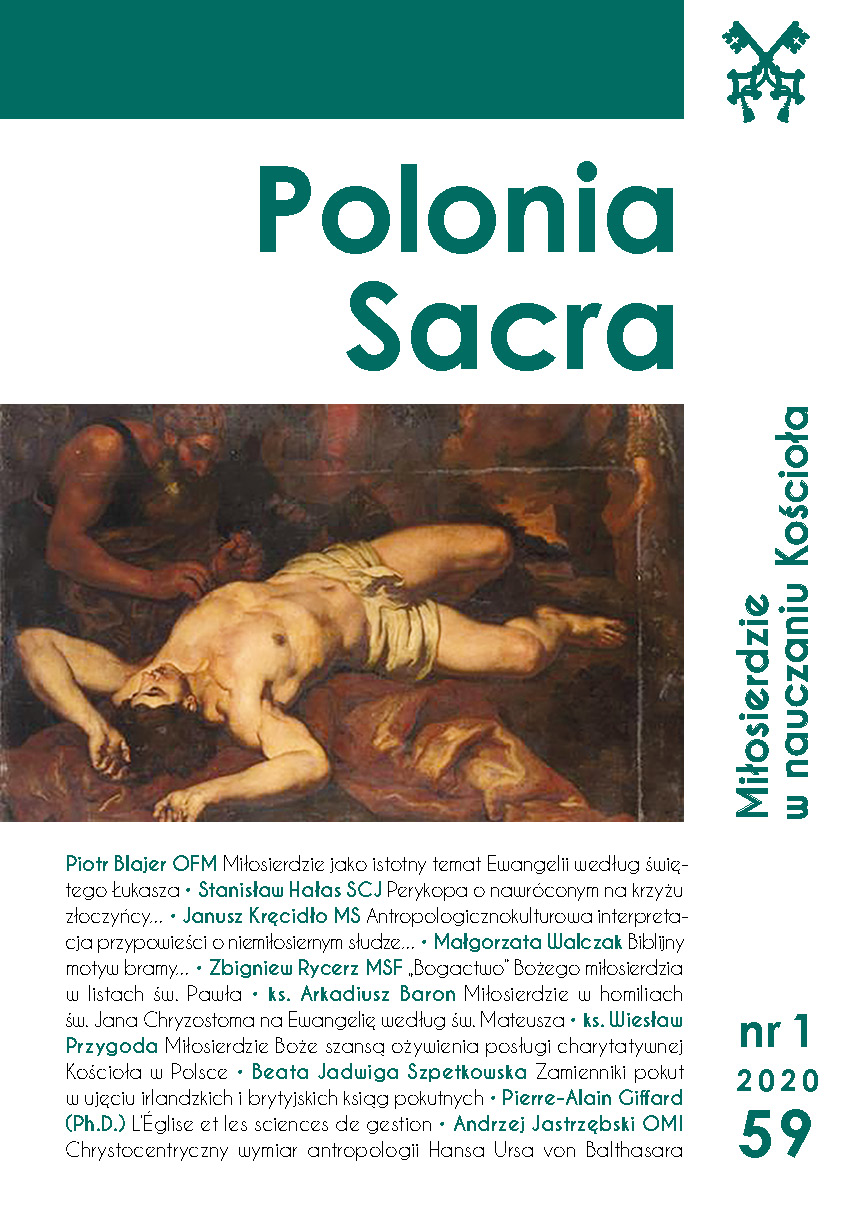Antropologicznokulturowa interpretacja przypowieści o niemiłosiernym słudze (Mt 18, 23–35)
DOI:
https://doi.org/10.15633/ps.3563Słowa kluczowe:
przypowieść Mt 18, 23–35, egzegeza antropologicznokulturowa, miłosierdzie, przebaczenie, modlitwa Ojcze naszAbstrakt
Przedmiotem prowadzonych w artykule analiz jest ekspozycja teologii miłosierdzia zawartej w przypowieści Jezusa w Mt 18, 23–35. Tekst ten został przebadany w świetle trzech kryteriów antropologicznokulturowych, które pozwoliły odczytać tę przypowieść w świetle realiów życia autora i adresatów. Są to: ideologia królewska, relacja „patron – klient” oraz honor i wstyd. Rezultatem analiz jest głębsze wyeksponowanie przesłania teologicznego Mt 18, 23–35: bezwarunkowe miłosierdzie, które Bóg okazuje grzesznikom, powinno stymulować w nich wzajemne okazywanie sobie przebaczenia win.
Bibliografia
Bazzana G.B., Basileia and Debt Relief: The Forgiveness of Debts in the Lord’s Prayer in the Light of Documentary Papyri, „Catholic Biblical Quarterly” 73 (2011), s. 511–525.
Carter W., Resisting and Imitating the Empire: Imperial Paradigms in Two Matthean Parables, „Interpretation” 56 (2002), s. 260–272.
Crossan J.D., In Parables: The Challenge of the Historical Jesus, New York 1973.
De Boer M.C., Ten Thousand Talents? Matthew’s Interpretation and Redaction of the Parable of the Unforgiving Servant (Matt 18:23–36), „Catholic Biblical Quarterly” 50 (1988), s. 214–232.
Deidun T.J., The Parable of the Unmerciful Servant (Mt 18:23–35), „Biblical Theology Bulletin” 6 (1976), s. 203–224.
Drury J., The Parables in the Gospels: History and Allegory, New York 1985.
Eck E. van, Honor and debt release in the Parable of the Unmerciful Servant (Mt 18:23–33): A social-Ssientific and realistic reading, „HTS Theological Studies” 71 (2005) no. 1, s. 1–11.
Józef Flawiusz, Dawne dzieje Izraela, tłum. Z Kubiak, J. Radożycki, t. 1–2, Warszawa 2001.
Keach B., Exposition of the Parables in the Bible, Grand Rapids 1978.
Keener C.S., The Gospel of Matthew: A Socio-Rhetorical Commentary, Grand Rapids 2009.
Lambrecht J., Out of the Treasure: The Parables in the Gospel of Matthew, Louvain 1992.
Louw J.P., Nida E.A., Greek-English Lexicon of the New Testament based on Semantic Domains, New York 1999.
Malina B.J., Rohrbaugh R.L., Social Science Commentary on the Synoptic Gospels, Minneapolis 2003.
Moxnes H., Patron-Client Relations and the New Community in Luke-Acts, w: The Social world of Luke-Acts: Models for Interpretation, ed. J.H. Neyrey, Peabody 1991, s. 241–268.
Orygenes, Komentarz do Ewangelii według Mateusza, Kraków 2003 (Źródła Myśli Teologicznej, 10).
Roose H., La reviviscenza della colpa e l’eliminazione della remissione del debito (il servo spietato: Mt 18, 23–35), w: Compendio delle parabole di Gesù, ed. R. Zimmermann, Brescia 2011, s. 708–731.
Schneider S., Barmherzigkeit und Zorn! Überlegungen zum Gleichnis vom unbarmherzigen Knecht (Mt 18, 23–35), „Biblische Zeitschrift” 59 (2015) no. 2, s. 161–178.
Snodgrass K.R., Stories with Intent: A Comprehensive Guide to the Parables of Jesus, Grand Rapids 2008.
Via D.O., The Parables: Their Literary and Existential dimension, Philadelphia 1967.
Pobrania
Opublikowane
Numer
Dział
Licencja
Autorzy publikujący w czasopiśmie udzielają jego wydawcy zgody o następującej treści:
- Autor zachowuje autorskie prawa majątkowe do utworu, a jednocześnie udziela wydawcy czasopisma zgody na jego pierwszą publikację w wersji drukowanej i wersji online na licencji Creative Commons Uznanie autorstwa 4.0 Międzynarodowe oraz zgody na wykonywanie opracowań, w tym przekładów.
- Autor ma możliwość udzielania zgody niewyłącznej na opublikowanie utworu w wersji, która ukazała się w czasopiśmie (np. zamieszczenia go w repozytorium instytucjonalnym lub opublikowania w książce), wraz z informacją o jego pierwszej publikacji w czasopiśmie.
- Autor może umieścić swój utwór online (np. w repozytorium instytucjonalnym lub na swojej stronie internetowej) jeszcze przed zgłoszeniem utworu do czasopisma.

